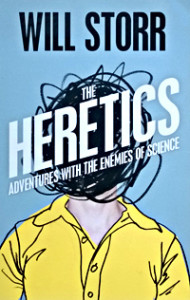The Heretics
Adventures with the Enemies of Science
by Will Storr. Published by Picador www.picador.com
“Pan narrans” – the storytelling ape, Terry Pratchett’s epithet for Homo Sapiens, is the phrase that stuck in my mind when reading ‘Heritics’. At heart, the book is about stories. Not the Hollywood blockbuster or novel or campfire tale sort. Rather, it’s the stories we tell about how we want people to think of us. It’s the stories we tell about how we want to think of ourselves.
Storr isn’t a professional skeptic or science writer (his last book was about ghost hunters) but he is a journalist interested in what makes people tick. Particularly, people with viewpoints that put them at the outskirts of society. Why do they believe – sometimes in spite of overwhelming evidence and at great personal cost – what they believe? How do they cast themselves as the heroes of their personal stories?
He is candid about his own story. His failures as a boyfriend, dropping out of college, shoplifting, his years on a psychiatrist’s couch trying to deal with his own sense of – as he describes it – ‘wrongness‘. It’s a disquieting set of insights for the reader. Not at all what we expect of our dispassionate purveyors of popular science. A little as if David Attenborough took five minutes in the middle of a lecture on the lifestyle of the Meerkat to enlighten us on his relationship problems. But Storr uses this – eventually- endearing vulnerability as a mental skeleton key to get us inside the world of the heretics, these people for whom evidence seems irrelevant and against who’s beliefs ‘facts don’t work’.
Some of the book is interviews with psychics and scientists, past life therapists and psychologists – the standard ‘talking head’ approach to science reporting. This, in itself, is fascinating reading. We discover the ‘makes sense stopping rule’ where the we look for evidence in a debate only until we find enough to confirm a previously existing bias then stop, satisfied that we have examined all the evidence. Or ‘cognitive dissonance’, where the brain works overtime to smooth out conflicts between what we want to believe and what the facts tell us, even giving us a little neurochemical pleasure ‘kick’ when we’ve satisfactorily rationalised away conflicting information so that we can, Alice-like, believe six (or more) impossible things before breakfast.
The greatest insights come though when Storr inserts himself into these ‘heretical’ belief systems. He sits with a bickering UFO group in a forest at midnight trying to psychically contact aliens. He joins with thousands of followers of Swami Ramdev in Alexandra Palace to practice his yogic breathing exercises to cure (almost) all ills. He goes undercover (at some personal risk) with a group of fascists on a tour of concentration camps led by Holocaust denier David Irving. He joins a skeptics group and gently grills that doyen of rationalists, James Randi.
Despite the delving, Storr doesn’t completely expose the core of what drives these people but we get definite glimpses. Brief clearings in the clouds of mutual incomprehension that allow us to almost understand some of their stories. “How free is a mind that never travels an inch” ask Storr and by the end of ‘Heritics’ I felt that I traveled at least a little way in understanding the ‘enemies of science’. Perhaps Irving isn’t quite the villain. Perhaps Randi isn’t quite the hero. Perhaps it just depends on which story you choose.
